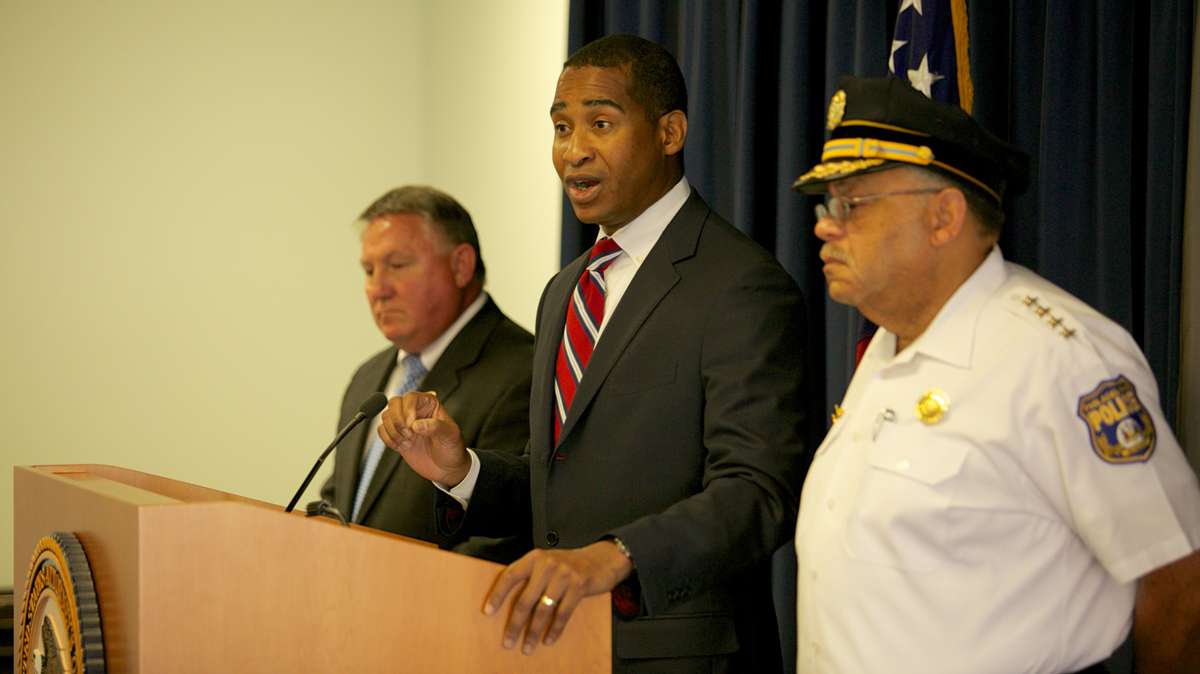Corrupt cops and Philly’s drug game [audio]
Listen
U.S. Attorney Zane David Memeger speaks at Wednesday's press conference on six Philadelphia Police narcotics officers who'd been arrested. (Nathaniel Hamilton/for NewsWorks)
I remember Philadelphia’s open-air drug markets. They thrived in the city’s poorest communities like drug-fueled drive-thrus that sometimes stretched for blocks.
There was 8th and Butler, the notoriously violent fulcrum that swung a community from chaos to ruin and back again.
There was Germantown and Cambria, where heroin dealers stood on one end of the block. On the other end, men would yell “Works!” as they sold needles to addicts near Fairhill Cemetery.
Yet another corner, 5th Street near Allegheny, was home to orange-topped crack capsules.
There were countless similar corners in between.
I know because I was there.
Eyes-on experience
I heard the lookouts yell “Agua!” when police rode by. This was the warning call, and in such moments, dealers stashed their drugs, police feigned ignorance and customers waited anxiously for the farce to play out to completion.
That pervasive drug culture gave way to a more muted version in recent years, but one constant remained: There were always police officers that benefitted from the scourge of drugs in our city’s most impoverished communities.
And, in the 18 years since I kicked the drug habit that took me to those corners, not much has changed.
Wrong side of the law
This week, federal prosecutors charged six Philadelphia narcotics officers with robbery, extortion, kidnapping, conspiracy and related offenses. The charges were in connection with a corruption scheme that allegedly ran from 2006 to 2012.
Named in the federal indictment were officers Thomas Liciardello, 38; Perry Betts, 46; Michael Spicer, 46; Brian Reynolds, 43; John Speiser, 42 and Linwood Norman, 46. They allegedly conspired to rob drug suspects of over $500,000 in cash, drugs, and merchandise.
The 42-page indictment outlined outrageous police behavior including beating suspects, dangling one man from a balcony and knocking out his teeth, and stealing and reselling drugs. The officers allegedly filed false police reports to cover the crimes.
Police Commissioner Charles Ramsey, who has worked to root out this kind of corruption, attended the news conference at which the charges were announced.
He called it one of the worst cases of corruption he’s ever heard, adding, “These officers don’t represent the majority of the department.”
Having worked with police officers during my days in police radio, I know that Ramsey is right.
Intertwined corruption
Most police officers are decent people who work hard to do a difficult job. But here is the awful truth: The drug-fueled culture that has destroyed entire Philadelphia neighborhoods could not exist without police corruption.
I knew that when I wrote my first novel, “Pipe Dream,” a tale of corruption and addiction centered around a North Philadelphia drug corner.
That’s why the most ruthless characters in the book were neither drug dealers nor addicts. The most brutal characters were cops, because that was the reality I’d come to know on the streets.
I know there are those who are shocked to know some police officers double as drug dealers, but if you’ve seen drugs kill a community as police seemingly do nothing, none of these charges is surprising.
What now?
I can only hope that this indictment, and the media circus that surrounds it, will break the pattern in which a corner will be shut down with great fanfare and quietly revived a few weeks later.
It is a pattern in which corrupt cops will be punished, only to be replaced by others.
Changing that pattern requires us to admit that we knew the corruption was there.
Changing that pattern demands that we do much more than talk and complain.
If we are going to move beyond the cycle that enables the drug culture, we must learn to treat every community the same.
We can’t continue to allow poor neighborhoods to be besieged by cops who double as robbers. If we do, it won’t be long before the cycle expands, before the drug dealing moves, before addiction kills more people, before we lose our moral compass, and corruption holds all of us in bondage.
More on Jones’s website.
WHYY is your source for fact-based, in-depth journalism and information. As a nonprofit organization, we rely on financial support from readers like you. Please give today.


